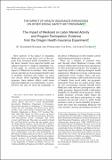The Impact of Medicaid on Labor Market Activity and Program Participation: Evidence from the Oregon Health Insurance Experiment
Author(s)
Baicker, Katherine; Finkelstein, Amy; Song, Jae; Taubman, Sarah
DownloadFinkelstein_The impact.pdf (467.8Kb)
PUBLISHER_POLICY
Publisher Policy
Article is made available in accordance with the publisher's policy and may be subject to US copyright law. Please refer to the publisher's site for terms of use.
Terms of use
Metadata
Show full item recordAbstract
In 2008, a group of uninsured low-income adults in Oregon was selected by lottery for the chance to apply for Medicaid. Using this randomized design and 2009 administrative data, we find no significant effect of Medicaid on employment or earnings. Our 95 percent confidence intervals allow us to reject that Medicaid causes a decline in employment of more than 4.4 percentage points, or an increase of more than 1.2 percentage points. Medicaid increases food stamps receipt, but has little, if any, impact on receipt of other measured government benefits, including SSDI.
Date issued
2014-05Department
Massachusetts Institute of Technology. Department of EconomicsJournal
American Economic Review
Publisher
American Economic Association
Citation
Baicker, Katherine, Amy Finkelstein, Jae Song, and Sarah Taubman. “ The Impact of Medicaid on Labor Market Activity and Program Participation: Evidence from the Oregon Health Insurance Experiment.” American Economic Review 104, no. 5 (May 2014): 322–328. © 2014 American Economic Association
Version: Final published version
ISSN
0002-8282
1944-7981